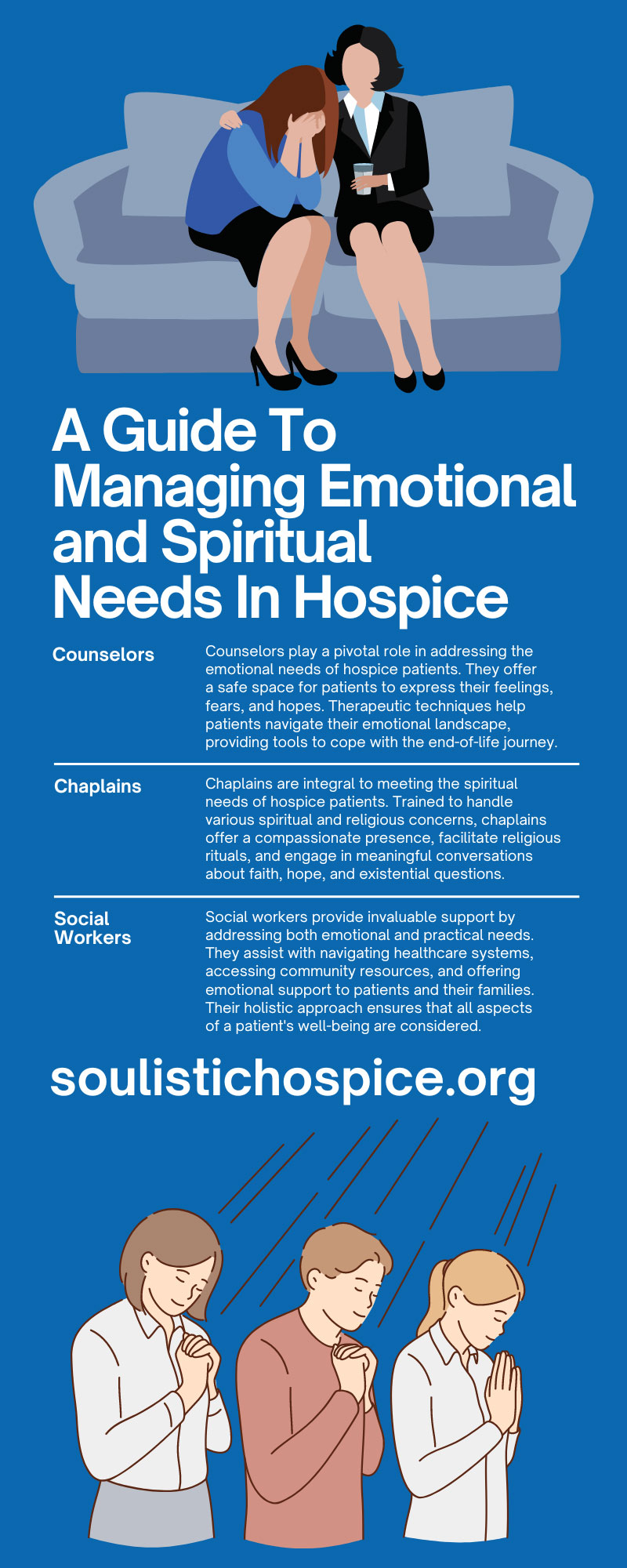
When someone enters hospice care, the focus shifts from curative treatment to comfort and quality of life. Hospice care is designed to support individuals in the final phase of a terminal illness, ensuring their remaining time is as peaceful and comfortable as possible. While physical care is paramount, addressing the emotions and spirits of patients and their families is equally crucial. We’ll provide a guide to managing emotional and spiritual needs in hospice.
The Importance of Expanding Beyond Physical Care
Hospice care isn't just about managing pain and symptoms; it's about nurturing the person as a whole. The focus on physical health can often overshadow emotional and spiritual needs, but they are integral to a person's overall well-being. By addressing these aspects, caregivers can offer a more comprehensive approach that honors their patients' dignity and humanity.
Understanding Emotional Needs in Hospice
Patients in hospice care often face a range of emotional challenges. These can include feelings of fear, anxiety, depression, and isolation, which may stem from the uncertainty of their condition, the pain they experience, and the thought of leaving loved ones behind. In addition, the loss of independence and changes in physical appearance can further exacerbate these emotions.
Understanding these challenges is the first step in providing effective emotional support. Crucial measures include providing a compassionate listening ear, offering professional counseling services, and creating a supportive environment where both patients and caregivers can express their feelings openly.
Additionally, regular respite care can help alleviate caregivers' stress and give them much-needed time to recharge. By addressing these emotional challenges, we can help improve the quality of life for hospice patients and their caregivers.
Hospice Strategies for Emotional Support
Hospice providers employ various strategies to alleviate emotional challenges, ensuring that patients and their families receive comprehensive support. Many hospice facilities offer activities and therapies designed to provide comfort and promote emotional well-being during this difficult time. Some common strategies for emotional support in hospice include:
- Counseling Services: Professional counselors are available to talk through feelings and provide coping strategies.
- Support Groups: Facilitated gatherings where patients and caregivers can share their experiences and support one another.
- Art and Music Therapy: Creative outlets that allow patients to express their emotions through forms of art.
- Pet Therapy: Interaction with animals to provide comfort and reduce stress.
- Life Review Therapies: Encouraging patients to reflect on their life experiences, achievements, and relationships, fostering a sense of closure and peace.
Understanding Spiritual Needs in Hospice
End-of-life care can prompt profound spiritual questions and reflections. Patients may seek to understand the meaning of their lives or find peace with their beliefs.
For some, this period is a time to re-examine their spiritual beliefs and experiences, looking for answers and comfort. Others may want to engage in prayer and rituals or connect with their faith community, finding solace in shared beliefs and practices.
Additionally, they might seek guidance from spiritual leaders or counselors to help navigate these complex emotions and thoughts, ultimately aiming to find a sense of closure and tranquility as they approach the end of their journey.
Hospice Strategies for Spiritual Support
Hospices often provide comprehensive spiritual care, addressing the spiritual needs of patients and their families. This care ensures that patients find peace and comfort during their final days. Some common spiritual support strategies include:
- Chaplains and Spiritual Advisors: Available to discuss spiritual concerns, provide rituals, and offer prayers.
- Meditation and Mindfulness: Techniques to help patients find inner peace and manage stress.
- Religious Services: Arrangements for religious ceremonies or visits from clergy.
- Spiritual Counseling: One-on-one sessions to address specific spiritual struggles or questions.
- Sacred Texts and Materials: Providing access to religious or spiritual literature that can offer comfort and guidance.
How Emotional and Spiritual Support Benefits Patients
Providing emotional and spiritual support can significantly improve the quality of life for hospice patients. These forms of support can reduce feelings of anxiety and depression, enhance a sense of peace and acceptance, and provide a deeper sense of connection to loved ones and personal beliefs. Patients who receive comprehensive emotional and spiritual care often report an elevated sense of well-being and satisfaction with their hospice experience.
The Role of Counselors, Chaplains, and Social Workers in Hospice
In hospice care, managing emotional and spiritual needs requires a coordinated effort from a team of dedicated professionals. Counselors, chaplains, and social workers each bring unique skills and perspectives, working synergistically to provide holistic care.
Their combined efforts ensure that patients and their families receive comprehensive support, helping them navigate the complex emotional and spiritual landscapes of end-of-life care. By fostering a compassionate and supportive environment, these professionals play a crucial role in enhancing the overall quality of hospice care.
Counselors
Counselors play a pivotal role in addressing the emotional needs of hospice patients. They offer a safe space for patients to express their feelings, fears, and hopes. Therapeutic techniques help patients navigate their emotional landscape, providing tools to cope with the end-of-life journey.
Chaplains
Chaplains are integral to meeting the spiritual needs of hospice patients. Trained to handle various spiritual and religious concerns, chaplains offer a compassionate presence, facilitate religious rituals, and engage in meaningful conversations about faith, hope, and existential questions.
Social Workers
Social workers provide invaluable support by addressing both emotional and practical needs. They assist with navigating healthcare systems, accessing community resources, and offering emotional support to patients and their families. Their holistic approach ensures that all aspects of a patient's well-being are considered.
Support for Families
The emotional and spiritual support offered in hospice care extends beyond the immediate needs of patients to include their families, who often face significant stress and grief during this time. Hospices provide bereavement counseling to support families before and after the loss of their loved one. They facilitate family meetings to ensure everyone is informed and involved in care decisions.
Additionally, hospices offer educational resources to inform families about what to expect during the end-of-life process and how to cope. They also provide respite care, offering temporary relief for primary caregivers.
Enhancing the Hospice Experience
Considering the patient's preferences and values is essential in creating a truly personalized care plan. This might involve honoring cultural traditions, respecting religious practices, or accommodating specific wishes for end-of-life experiences. Open communication with the patient and their family is key to understanding and integrating these elements into the care plan.
Building trust within the care team and maintaining open lines of communication are fundamental to providing excellent hospice care. Regular meetings, transparent discussions, and a willingness to listen to patients and their families foster a collaborative environment, ensuring everyone feels heard, respected, and supported.
Addressing the emotional and spiritual needs of hospice patients is not just beneficial—it is essential. It contributes to a more holistic approach to care, enhancing the quality of life for both patients and their families. Plus, embracing this aspect of hospice care can lead to profound and meaningful experiences during the end-of-life journey.
At Soulistic Hospice, we are committed to providing comprehensive emotional and spiritual support. Contact us today to learn more about how we can assist you in creating a compassionate and holistic hospice experience.









